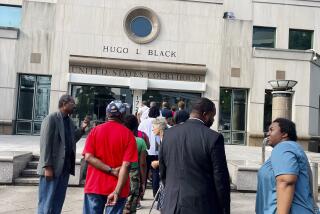New Sentencing Guides ‘Cold,’ U.S. Judges Say
- Share via
Judges of the U.S. District Court in Los Angeles, sitting as an en banc panel for the first time in the court’s history, on Monday considered constitutional challenges to sweeping new guidelines that one judge said render the sentencing process “as cold and implacable and immutable as a computer.”
A total of 20 of the court’s 32 judges heard pending challenges to the guidelines, which were adopted by the U.S. Sentencing Commission at Congress’ direction last November in an attempt to control the disparity in sentencing that has been the product of centuries of broad judicial discretion.
The guidelines, which apply to all federal crimes that occurred after Nov. 1, set up a prescribed range of penalties depending on the extent and seriousness of the crime and a defendant’s criminal record. Minimum and maximum penalties do not vary more than 25%, and judges are permitted to deviate from them only if a case involves factors not considered by the commission.
District judges throughout the country have issued divided opinions on the constitutionality of the rules, leaving many courts in confusion as the applicability of the guidelines varies from courtroom to courtroom.
The legal assault has centered on whether the commission, as an arm of the judicial branch, had the authority to assume what has historically been a function of the legislative branch.
Several Los Angeles judges, sitting in a special appellate courtroom in Pasadena in what Chief Judge Manuel L. Real called a “historic event,” expressed clear irritation at the notion of any independent commission fixing sentencing options for federal judges. The hearing provided a rare opportunity for the jurists to exchange ideas and focus their collective ire on what many have viewed as an affront to their judicial independence.
“It seems the term sentencing guidelines is a misnomer. It seems these are not guidelines, but hard and fast rules,” said U.S. District Judge James M. Ideman. “It’s as cold and implacable and immutable as a computer. You push a button and out comes the sentence.”
“What it does is it destroys all the discretionary function of a judge and it gives an opportunity for prosecutorial misbehavior,” added U.S. District Judge Dickran Tevrizian, who said the guidelines present the opportunity for “overzealous” prosecutors to determine sentences according to the crimes with which they charge a defendant.
Lawyers for the sentencing commission, which is unofficially joining the Justice Department in defending the guidelines, argued that the rules attempt to rectify “a major, major problem” in the disparities in sentencing.
Donald Purdy, representing the commission, pointed to a 1974 study of sentences handed out in the New York area for extortion. Penalties, he said, ranged from three years to 20 years for similar crimes.
Respect for the Law
“What the commission attempted to do, one, was to increase the respect for the law in this country, and, secondly, to structure discretion,” Purdy said.
However, the primary issue in the legal debate is not whether the guidelines are a good idea, but whether Congress violated the Constitution in delegating its power to set sentencing ranges to an independent commission.
The 1984 law that set up the sentencing commission erred even further, argued deputy federal public defender Carlton Gunn, by making the commission a part of the judicial branch, a move that unconstitutionally broadened the powers of that branch.
The Justice Department has conceded that there may have been a problem in designating the commission as an arm of the judicial branch, but attorney David Anderson went on to argue that the commission can properly be considered an arm of the executive branch because of the President’s power to appoint and remove all of its 28 members.
Similar Hearing Held
Federal judges in San Diego held a similar en banc hearing on the guidelines earlier this year, issuing divided rulings that are applicable only within the courtroom of each judge and producing what one public defender there described as “chaotic” conditions.
Judge Real, who called Monday’s hearing, said the court in Los Angeles is considering issuing an en banc ruling that would apply to all cases in Los Angeles, rather than seeking individual rulings from each judge.
In any case, the issue will ultimately be decided by the U.S. Supreme Court. To help resolve the matter in the meantime, the U.S. 9th Circuit Court of Appeals has scheduled oral arguments on an expedited appeal of the matter for May 13. That court’s decision will be binding on trial courts throughout the West, pending the high court’s findings.
More to Read
Sign up for Essential California
The most important California stories and recommendations in your inbox every morning.
You may occasionally receive promotional content from the Los Angeles Times.










